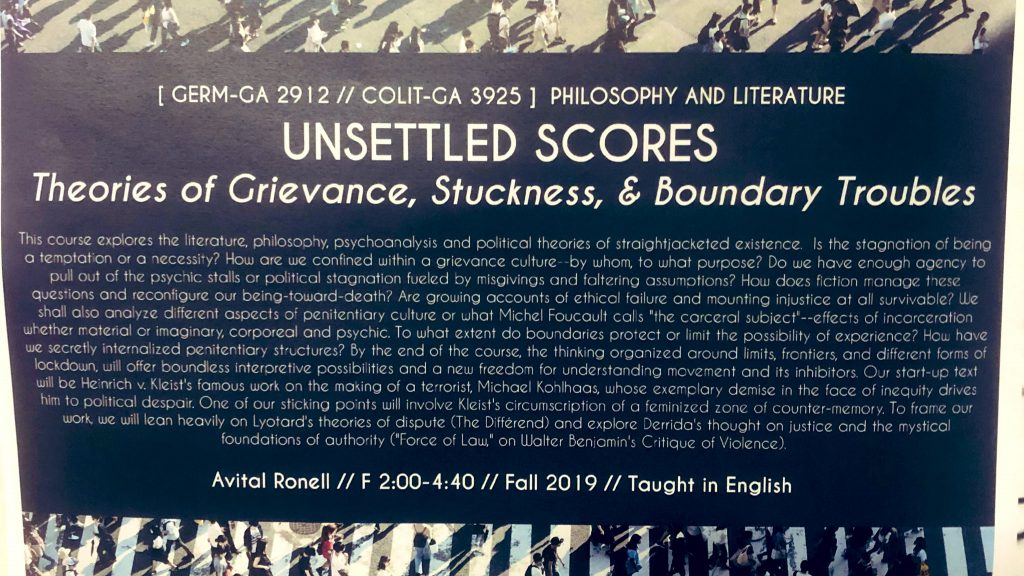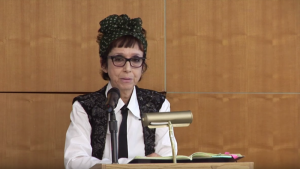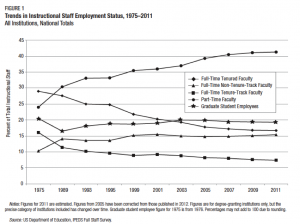Avital Ronell & Judith Butler: a cautionary tale of power & accountability in academia
by Pauline Park
2017 was the year of reckoning for men who had long engaged in sexual harassment with impunity. Ronan Farrow broke the story of Harvey Weinstein’s long and sordid history of sexual harassment and sexual assault as the most powerful mogul in Hollywood and won a Pulitzer Prize for his groundbreaking reporting. Many heads were to roll after Harvey’s, most of them heteronormative conventionally gendered men but at least one closeted gay man (Kevin Spacey) and even a few women. Manhattan district attorney Cyrus Vance, Jr.’s failure to prosecute Weinstein and his connection with presidents and presidential candidates from Bill and Hillary Clinton to Barack Obama tainted government as well as the entertainment industry.
“I can only speak for myself since the signatories of the letter addressed to the NYU administration regarding the sexual harassment charges brought against Avital Ronell are not a group with a single view, and different authors helped to craft the draft version of the letter that appeared online without our consent. When the signatories learned that termination of employment for Ronell was under consideration by NYU, we were bewildered by the severity of this possible sanction. We understood she was accused of conducting a ‘romantic friendship’ and that her emails had been scrutinized for evidence of a sexual relationship. Our aim was not to defend her actions – we did not have the case in hand – but to oppose the termination of her employment as a punishment. Such a punishment seemed unfair given the findings as we understood them. In hindsight, those of us who sought to defend Ronell against termination surely ought to have been more fully informed of the situation if we were going to make an intervention.
“Moreover, the letter was written in haste and the following are my current regrets about it. First, we ought not to have attributed motives to the complainant, even though some signatories had strong views on this matter. The claims of sexual harassment have too often been dismissed by discrediting the complainant, and that nefarious tactic has stopped legitimate claims from going forward and exacerbated the injustice. When and where such a claim proves to be illegitimate, it should be demonstrated on the basis of the evidence alone.
“Second, we should not have used language that implied that Ronell’s status and reputation earn her differential treatment of any kind. Status ought to have no bearing on the adjudication of sexual harassment. All faculty should be treated the same under Title IX protocols, that is, subject to the same rules and, where justified, sanctions. Immediately after the confidential draft letter was published online, I was in direct communication with the MLA officers (the Executive Director, the President and the First Vice-President) to apologize for the listing of my position within the organization after my name. I acknowledged that I should not have allowed the MLA affiliation to go forward with my name. I expressed regret to the MLA officers and staff, and my colleagues accepted my apology. I extend that same apology to MLA members. We all make errors in life and in work. The task is to acknowledge them, as I hope I have, and to see what they can teach us as we move forward.” (Judith Butler, “Judith Butler Explains Letter in Support of Avital Ronell,” letter to the editor, Chronicle of Higher Education 20 August 2018).
Butler’s non-apology is striking in its lack of real remorse for accusing Nimrod Reitman of ‘malicious intention,’ saying only that “we ought not to have attributed motives to the complainant, even though some signatories had strong views on this matter. The claims of sexual harassment have too often been dismissed by discrediting the complainant, and that nefarious tactic has stopped legitimate claims from going forward and exacerbated the injustice. When and where such a claim proves to be illegitimate, it should be demonstrated on the basis of the evidence alone.” But how could ‘some signatories’ have ‘strong views on this matter’ if as Butler writes, that “we did not have the case in hand”…?
If they were not ‘fully apprised of the facts of the case,’ as Butler et al. admitted in that statement, then why did she and her co-signatories insist that they knew with apparent certainty that no sexual harassment had ever taken place between Ronell and Reitman and that the latter was driven by malicious intent? And how responsible was it for Butler to have written a letter ‘in haste’ when two academic careers were hanging in the balance and the May 11 letter was intended to have a decisive impact on the outcome of the NYU investigation? Simply saying “we all make errors” is itself irresponsible.
Even more irresponsible is Butler’s failure to acknowledge the abuse of power in using the full weight of the MLA’s organizational authority to try to influence the NYU administration’s decision without having consulted with a single MLA colleague; it is actually much worse than this, because Butler sent the letter in secret, not even informing MLA colleagues of the letter after sending it, as Butler herself acknowledges in this statement. I have served on multiple boards of directors and have chaired two as well as serving as the executive director of a not-for-profit organization; I would never have signed a letter on a matter of this importance to anyone as board chair or president without consulting my colleagues before sending it and it is simply inconceivable that one would send such a letter and conceal its very existence from one’s board colleagues, all the more so given that Butler is not yet president but merely president-elect and therefore not authorized to make any statement on behalf of the MLA.
But even more serious than Butler’s outrageous and unacknowledged abuse of power is her utterly insincere declaration that “we should not have used language that implied that Ronell’s status and reputation earn her differential treatment of any kind. Status ought to have no bearing on the adjudication of sexual harassment.” Anyone reading the May 11 letter can see that Butler et al. are more than just ‘implying’ that “Ronell’s status and reputation earn her differential treatment of any kind.” Butler et al. write, “There is arguably no more important figure in literary studies at New York University than Avital Ronell… We testify to the grace, the keen wit, and the intellectual commitment of Professor Ronell and ask that she be accorded the dignity rightly deserved by someone of her international standing and reputation. If she were to be terminated or relieved of her duties, the injustice would be widely recognized and opposed…”
“And we should not have used language that implied that Ronell’s status and reputation earn her differential treatment of any kind. Judith Butler was forced into a humiliating climbdown from her letter because it was rightly understood as condoning sexual harassment and excoriating the university for daring even to investigate the charges because of the prominence and power of the accused without any expression of concern for the victim of Ronell’s predations. Christina Hoff Sommers, a scholar with the American Enterprise Institute, tweeted that the Butler letter “echoed the defenses of male harassers” as in fact it did.
Butler & Co. seem to be saying that stripping someone of tenure who has such status in the profession is in and of itself an ‘injustice’ even if she were guilty of the crimes she was accused of — and conversely, that it would be no injustice whatsoever to demote or dismiss someone who lacked such status in academia. Butler et al. are also clearly asserting that someone without Ronell’s ‘international standing and reputation’ does not deserve ‘dignity,’ which is to be accorded only to the powerful.
“El Principito después de acabar Filosofía y Letras”
(The Little Prince after finishing a degree in philosophy & letters)
“Yo voy a tomar esa con forma de sombrero.” (I’ll take the one in the shape of a hat.)
“Serpiente.” (Snake.)
~Lorena Velasco (@odepeza) periodista multimedia (multimedia journalist) Lisboa (Lisbon) (ojodepeza.com)
“most Baby … let’s cuddle like cubs”
“get your ass back home, darling … I am sorry I ever let you go!”
“I love you and long for you”
“You looked gorgeous. Couldn’t keep my eyes off you!!!”
“whispering to you, holding you”
“I’m so proud, loving power pump”
“you are arousing”
“my image during meditation: we’re on the sofa, your head on my lap, stroking your forehead, playing softly with yr hair, soothing you”
“I’ll see you at the orifice, I mean office”
“did you find your phallus?”
“it’s your cock-er-spaniel calling.”
“…I was crying when I did not hear back from you. It was a hard night, but I’m pulling together. Yes, I did need to talk to you and will have to stop reverting to that level of expectation, which puts too much pressure on you, I sense and see….”
“The academic job market is structured in many respects like a drug gang, with an expanding mass of outsiders and a shrinking core of insiders,” Alexandre Afonso wrote on the London School of Economics and Political Science Impact Blog (Alexandre Afonso, “How academia resembles a drug gang,” London School of Economics and Political Science Impact Blog, 19 September 2018). It is of course powerful academic oligarchs like Judith Butler and Avita Ronell — undisputed hegemonic figures in their fields — who are the drug lords in this analogy, as powerful in their world as Pablo Escobar once was as the head of the Medellin cartel; as tenured full professors holding endowed chairs, they have virtually unlimited power over untenured faculty and especially the graduate students whose careers depend on their active support and promotion. Since tenured faculty cannot be removed — except only rarely and in only the rarest and most exceptional circumstances — their position of near-absolute power creates circumstances and in fact a structure of power that is ripe for abuse and Ronell flagrantly abused that power as did Butler in using the enormous power and influence of the MLA to defend Ronell and insulate her abuse of power from even scrutiny. The economics of academia reflect an oppressive corporate neoliberal regime that wealthy, powerful academic oligarchs not only do nothing to challenge but benefit from while publicly deriding the very neoliberalism that they exploit for their own selfish gain — the very height of hypocrisy.
“Of the 50 ‘prominent’ academics who signed the notorious Butler letter, only 11 are under 60 and another 11 are over 70! The signatories, in other words, are indeed, like Ronell herself, older Establishment figures: they hold the endowed Comp Lit, German, and French chairs in the institutions of which they are often so critical. As such, they have a vested interest in preserving what they consider the status quo: deconstructionist theory with a feminist/lesbian cast. There are of course signatories who don’t fit into this mold and no doubt signed the letter just to be collegial and supportive, but the large majority are members of the in-circle, whether in the US or in France or Germany, and except for two signatories, Manthia Diawara and Gayatri Spivak, all are white — a fact no one has mentioned but which surely tells us something…”
As for the sexual harassment case itself, Perloff writes,
“When people in other fields and professions open the lengthy complaint, they are given a capsule view of two small departments that share faculty (German and Comp Lit), departments that only takes in a handful of graduate students a year, all of them, incidentally, on fellowship, departments in which a professor has an intimate and obsessive relationship with one particular student, which means making him the teacher’s pet at the expense of all the others. It is a dangerous power trip on her part. Various anonymous students have said as much on Facebook pages… both principals agree that the professor had the power to make or break the student’s career, and that in the end, she evidently did the latter. For if, as Ronell contends, Nimrod was simply not good enough to get one of the rare assistant professorships in German/Comp Lit available around the US, then why did she spend years of her life coaching him and being endlessly available to him? …is there another profession where the senior person with the power wouldn’t immediately be fired, given the evidence in this particular Complaint? …Certainly, I believe NYU is itself partly to blame for permitting an environment where professors and students share the intimacy these two people shared. And perhaps the tenure system is ripe for such abuse. But it won’t do to throw up our hands, as Masha Gessen does in her New Yorker piece when she concludes by citing Derrida (the ultimate star himself!) as having said that there can never, after all, be perfect justice… We cannot simply assume that those who are Stars (in our profession, as I have noted, largely a debatable category) don’t need to be accountable…”
Perloff is surely right that at the very least, Ronell has ‘terrible judgment’ and that NYU’s one-year suspension of her sends a message to grad students that the university does not take sexual harassment of them by faculty seriously at all. But of course, NYU is a profit-making corporation disguised as a non-profit academic institution; as NYU faculty member Lisa Duggan describes it, NYU is a real estate enterprise that offers courses.
(CWPA/Barcroft Images, via National Geographic, 4.2018)
Avital Ronell & Judith Butler: a cautionary tale of power & accountability in academia
by Pauline Park
2017 was the year of reckoning for men who had long engaged in sexual harassment with impunity. Ronan Farrow broke the story of Harvey Weinstein’s long and sordid history of sexual harassment and sexual assault as the most powerful mogul in Hollywood and won a Pulitzer Prize for his groundbreaking reporting. Many heads were to roll after Harvey’s, most of them heteronormative conventionally gendered men but at least one closeted gay man (Kevin Spacey) and even a few women. Manhattan district attorney Cyrus Vance, Jr.’s failure to prosecute Weinstein and his connection with presidents and presidential candidates from Bill and Hillary Clinton to Barack Obama tainted government as well as the entertainment industry.
“I can only speak for myself since the signatories of the letter addressed to the NYU administration regarding the sexual harassment charges brought against Avital Ronell are not a group with a single view, and different authors helped to craft the draft version of the letter that appeared online without our consent. When the signatories learned that termination of employment for Ronell was under consideration by NYU, we were bewildered by the severity of this possible sanction. We understood she was accused of conducting a ‘romantic friendship’ and that her emails had been scrutinized for evidence of a sexual relationship. Our aim was not to defend her actions – we did not have the case in hand – but to oppose the termination of her employment as a punishment. Such a punishment seemed unfair given the findings as we understood them. In hindsight, those of us who sought to defend Ronell against termination surely ought to have been more fully informed of the situation if we were going to make an intervention.
“Moreover, the letter was written in haste and the following are my current regrets about it. First, we ought not to have attributed motives to the complainant, even though some signatories had strong views on this matter. The claims of sexual harassment have too often been dismissed by discrediting the complainant, and that nefarious tactic has stopped legitimate claims from going forward and exacerbated the injustice. When and where such a claim proves to be illegitimate, it should be demonstrated on the basis of the evidence alone.
“Second, we should not have used language that implied that Ronell’s status and reputation earn her differential treatment of any kind. Status ought to have no bearing on the adjudication of sexual harassment. All faculty should be treated the same under Title IX protocols, that is, subject to the same rules and, where justified, sanctions. Immediately after the confidential draft letter was published online, I was in direct communication with the MLA officers (the Executive Director, the President and the First Vice-President) to apologize for the listing of my position within the organization after my name. I acknowledged that I should not have allowed the MLA affiliation to go forward with my name. I expressed regret to the MLA officers and staff, and my colleagues accepted my apology. I extend that same apology to MLA members. We all make errors in life and in work. The task is to acknowledge them, as I hope I have, and to see what they can teach us as we move forward.” (Judith Butler, “Judith Butler Explains Letter in Support of Avital Ronell,” letter to the editor, Chronicle of Higher Education 20 August 2018).
Butler’s non-apology is striking in its lack of real remorse for accusing Nimrod Reitman of ‘malicious intention,’ saying only that “we ought not to have attributed motives to the complainant, even though some signatories had strong views on this matter. The claims of sexual harassment have too often been dismissed by discrediting the complainant, and that nefarious tactic has stopped legitimate claims from going forward and exacerbated the injustice. When and where such a claim proves to be illegitimate, it should be demonstrated on the basis of the evidence alone.” But how could ‘some signatories’ have ‘strong views on this matter’ if as Butler writes, that “we did not have the case in hand”…?
If they were not ‘fully apprised of the facts of the case,’ as Butler et al. admitted in that statement, then why did she and her co-signatories insist that they knew with apparent certainty that no sexual harassment had ever taken place between Ronell and Reitman and that the latter was driven by malicious intent? And how responsible was it for Butler to have written a letter ‘in haste’ when two academic careers were hanging in the balance and the May 11 letter was intended to have a decisive impact on the outcome of the NYU investigation? Simply saying “we all make errors” is itself irresponsible.
Even more irresponsible is Butler’s failure to acknowledge the abuse of power in using the full weight of the MLA’s organizational authority to try to influence the NYU administration’s decision without having consulted with a single MLA colleague; it is actually much worse than this, because Butler sent the letter in secret, not even informing MLA colleagues of the letter after sending it, as Butler herself acknowledges in this statement. I have served on multiple boards of directors and have chaired two as well as serving as the executive director of a not-for-profit organization; I would never have signed a letter on a matter of this importance to anyone as board chair or president without consulting my colleagues before sending it and it is simply inconceivable that one would send such a letter and conceal its very existence from one’s board colleagues, all the more so given that Butler is not yet president but merely president-elect and therefore not authorized to make any statement on behalf of the MLA.
But even more serious than Butler’s outrageous and unacknowledged abuse of power is her utterly insincere declaration that “we should not have used language that implied that Ronell’s status and reputation earn her differential treatment of any kind. Status ought to have no bearing on the adjudication of sexual harassment.” Anyone reading the May 11 letter can see that Butler et al. are more than just ‘implying’ that “Ronell’s status and reputation earn her differential treatment of any kind.” Butler et al. write, “There is arguably no more important figure in literary studies at New York University than Avital Ronell… We testify to the grace, the keen wit, and the intellectual commitment of Professor Ronell and ask that she be accorded the dignity rightly deserved by someone of her international standing and reputation. If she were to be terminated or relieved of her duties, the injustice would be widely recognized and opposed…”
“And we should not have used language that implied that Ronell’s status and reputation earn her differential treatment of any kind. Judith Butler was forced into a humiliating climbdown from her letter because it was rightly understood as condoning sexual harassment and excoriating the university for daring even to investigate the charges because of the prominence and power of the accused without any expression of concern for the victim of Ronell’s predations. Christina Hoff Sommers, a scholar with the American Enterprise Institute, tweeted that the Butler letter “echoed the defenses of male harassers” as in fact it did.
Butler & Co. seem to be saying that stripping someone of tenure who has such status in the profession is in and of itself an ‘injustice’ even if she were guilty of the crimes she was accused of — and conversely, that it would be no injustice whatsoever to demote or dismiss someone who lacked such status in academia. Butler et al. are also clearly asserting that someone without Ronell’s ‘international standing and reputation’ does not deserve ‘dignity,’ which is to be accorded only to the powerful.
“El Principito después de acabar Filosofía y Letras”
(The Little Prince after finishing a degree in philosophy & letters)
“Yo voy a tomar esa con forma de sombrero.” (I’ll take the one in the shape of a hat.)
“Serpiente.” (Snake.)
~Lorena Velasco (@odepeza) periodista multimedia (multimedia journalist) Lisboa (Lisbon) (ojodepeza.com)
“most Baby … let’s cuddle like cubs”
“get your ass back home, darling … I am sorry I ever let you go!”
“I love you and long for you”
“You looked gorgeous. Couldn’t keep my eyes off you!!!”
“whispering to you, holding you”
“I’m so proud, loving power pump”
“you are arousing”
“my image during meditation: we’re on the sofa, your head on my lap, stroking your forehead, playing softly with yr hair, soothing you”
“I’ll see you at the orifice, I mean office”
“did you find your phallus?”
“it’s your cock-er-spaniel calling.”
“…I was crying when I did not hear back from you. It was a hard night, but I’m pulling together. Yes, I did need to talk to you and will have to stop reverting to that level of expectation, which puts too much pressure on you, I sense and see….”
“The academic job market is structured in many respects like a drug gang, with an expanding mass of outsiders and a shrinking core of insiders,” Alexandre Afonso wrote on the London School of Economics and Political Science Impact Blog (Alexandre Afonso, “How academia resembles a drug gang,” London School of Economics and Political Science Impact Blog, 19 September 2018). It is of course powerful academic oligarchs like Judith Butler and Avita Ronell — undisputed hegemonic figures in their fields — who are the drug lords in this analogy, as powerful in their world as Pablo Escobar once was as the head of the Medellin cartel; as tenured full professors holding endowed chairs, they have virtually unlimited power over untenured faculty and especially the graduate students whose careers depend on their active support and promotion. Since tenured faculty cannot be removed — except only rarely and in only the rarest and most exceptional circumstances — their position of near-absolute power creates circumstances and in fact a structure of power that is ripe for abuse and Ronell flagrantly abused that power as did Butler in using the enormous power and influence of the MLA to defend Ronell and insulate her abuse of power from even scrutiny. The economics of academia reflect an oppressive corporate neoliberal regime that wealthy, powerful academic oligarchs not only do nothing to challenge but benefit from while publicly deriding the very neoliberalism that they exploit for their own selfish gain — the very height of hypocrisy.
“Of the 50 ‘prominent’ academics who signed the notorious Butler letter, only 11 are under 60 and another 11 are over 70! The signatories, in other words, are indeed, like Ronell herself, older Establishment figures: they hold the endowed Comp Lit, German, and French chairs in the institutions of which they are often so critical. As such, they have a vested interest in preserving what they consider the status quo: deconstructionist theory with a feminist/lesbian cast. There are of course signatories who don’t fit into this mold and no doubt signed the letter just to be collegial and supportive, but the large majority are members of the in-circle, whether in the US or in France or Germany, and except for two signatories, Manthia Diawara and Gayatri Spivak, all are white — a fact no one has mentioned but which surely tells us something…”
As for the sexual harassment case itself, Perloff writes,
“When people in other fields and professions open the lengthy complaint, they are given a capsule view of two small departments that share faculty (German and Comp Lit), departments that only takes in a handful of graduate students a year, all of them, incidentally, on fellowship, departments in which a professor has an intimate and obsessive relationship with one particular student, which means making him the teacher’s pet at the expense of all the others. It is a dangerous power trip on her part. Various anonymous students have said as much on Facebook pages… both principals agree that the professor had the power to make or break the student’s career, and that in the end, she evidently did the latter. For if, as Ronell contends, Nimrod was simply not good enough to get one of the rare assistant professorships in German/Comp Lit available around the US, then why did she spend years of her life coaching him and being endlessly available to him? …is there another profession where the senior person with the power wouldn’t immediately be fired, given the evidence in this particular Complaint? …Certainly, I believe NYU is itself partly to blame for permitting an environment where professors and students share the intimacy these two people shared. And perhaps the tenure system is ripe for such abuse. But it won’t do to throw up our hands, as Masha Gessen does in her New Yorker piece when she concludes by citing Derrida (the ultimate star himself!) as having said that there can never, after all, be perfect justice… We cannot simply assume that those who are Stars (in our profession, as I have noted, largely a debatable category) don’t need to be accountable…”
Perloff is surely right that at the very least, Ronell has ‘terrible judgment’ and that NYU’s one-year suspension of her sends a message to grad students that the university does not take sexual harassment of them by faculty seriously at all. But of course, NYU is a profit-making corporation disguised as a non-profit academic institution; as NYU faculty member Lisa Duggan describes it, NYU is a real estate enterprise that offers courses.
(CWPA/Barcroft Images, via National Geographic, 4.2018)







One thought on “Avital Ronell & Judith Butler: a cautionary tale of power & accountability in academia”
Is no one replying to this? I think this is a great read. I have understood the outrage over the protective testimony the accused academic received from colleagues that is part of this post. The accuser has not received a protective testimony. What is more outrageous, the alleged harassment or the counter-allegation that the harassment did not take place and that there was a consensual exchange. If you regard the institution as a family and the senior administration of the institution as the parents while the employees are the children, then the parents did not listen to both children. Instead, they did what the Federal law requires them to do.
One more idea: I guess the letter by the colleagues is conflating academic contributions and personal integrity. The complaint about the professor did not touch upon her contributions to academic fields but delineated events that undermined the personal integrity of a subordinate by a supervisor. I wonder how a complaint about the quality of the academic contributions would have been received. My guess is that the professors that jumped onto penning a testimony for the high quality of the academic contributions of the defendant saw her own academic contributions endangered once a leading figure of the field could be convicted.